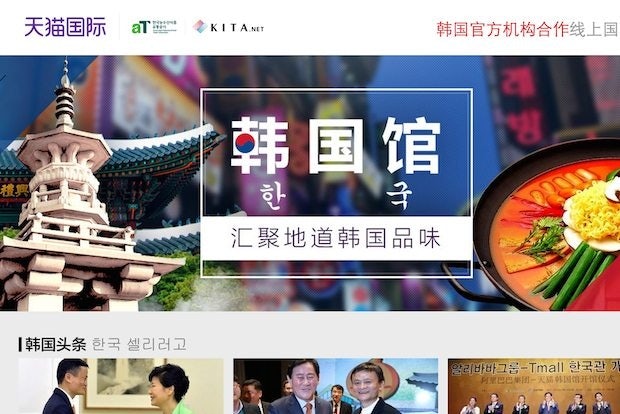
Tmall Global's Korean "pavilion" online shop.
As China’s online shoppers gain easier access to goods shipped from abroad, e-commerce giant Alibaba is working to stay ahead of the curve with the introduction of new international shopping option on its B2C platform Tmall.
On June 24, the company launched 11 country “pavilions” on its Tmall Global platform that serve as curated shopping sites with products hailing from each location. Tmall will work with the governments of countries including the United States, New Zealand, Australia, Switzerland, France, Britain, Spain, Singapore, Thailand, Malaysia, and Turkey on the platforms, which will also offer travel information about each country. The announcement comes after Tmall partnered with South Korea in May to launch its first country pavilion stocked with Korean brands, which are popular with Chinese consumers.
As the Chinese government has slowly begun to encourage cross-border online sales with special “bonded warehouse zones” in cities across China, Alibaba has been on the front line of the country’s international e-commerce boom. In October 2014, it introduced the Alipay ePass payment system, which has teamed up with international retailers including ASOS and Gilt to allow easier shopping from China. In addition, it also invested in e-commerce site ShopRunner and has said it will help brands on that platform ship to China.
This international push is also part of a path toward “premiumization” that Alibaba has been forging as it works to boost its international image by adding more foreign brands—especially luxury labels such as Burberry and Calvin Klein. These efforts are likely due in large part to the company’s interest in courting international investors in the wake of its New York IPO. It has previously teamed up with business and government organizations from global luxury capitals the UK, Italy, and France to promote the countries’ brands on the site.
The company has faced struggles with boosting its image abroad, however, as it contends with a major lawsuit from luxury conglomerate Kering and was accused by the Chinese government in January of allowing sales of fakes to proliferate on its platforms when the State Administration for Industry and Commerce (SAIC) posted an accusation on its website. While the company said it has since cleared up these allegations with Chinese regulators, the SAIC note prompted an investigation of the company by a U.S. law firm for possibly violating U.S. federal securities laws. In order to respond to these issues, the company has been announcing the implementation of new measures to fight fakes on Tmall and Taobao.
The site’s forays into the U.S. e-commerce market have also met with limited success. This week, the company announced that it would be selling its stake in lifestyle e-commerce site 11 Main, which failed to take off with American consumers.
In the wake of these developments, the company is likely hoping for a boost to both its image and its sales with the new international partnerships. As it taps into Chinese consumer demand for international goods purchased from overseas, its cooperation with foreign governments can boost its legitimacy in the eyes of both international brands and investors as it faces a bumpy road in fighting fakes and resonating with American consumers.